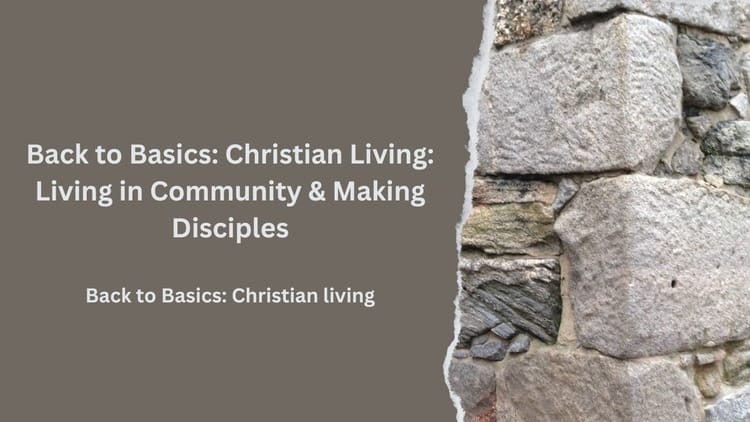Back to Basics: Using the Bible as Our Authority in Our Christian Lives!

Finding Stability & Direction through God's Unchanging Word!
In an ever-changing world filled with competing voices and shifting values, Christians need a solid foundation upon which to build their lives. That foundation is the Word of God. The Bible isn't merely a collection of ancient texts; it is the living, breathing revelation of God Himself—timeless in its wisdom and powerful in its application. As believers, we are called to use Scripture as the ultimate authority in our lives, allowing it to shape our thoughts, guide our decisions, and transform our character.
The Bible as God's Inspired Word
Before we can use the Bible as our authority, we must first understand what it is. Scripture itself tells us in 2 Timothy 3:16-17 [KJV]: "All scripture is given by inspiration of God, and is profitable for doctrine, for reproof, for correction, for instruction in righteousness: That the man of God may be perfect, throughly furnished unto all good works." This passage affirms that Scripture is God-breathed—it carries His divine authority and is useful for teaching us what is true (doctrine), showing us where we're wrong (reproof), helping us get back on track (correction), and training us to live righteously.
Furthermore, 2 Peter 1:20-21 [KJV] explains the divine origin of Scripture: "Knowing this first, that no prophecy of the scripture is of any private interpretation. For the prophecy came not in old time by the will of man: but holy men of God spake as they were moved by the Holy Ghost." The Bible wasn't written by men expressing their individual opinions, but by individuals guided by the Holy Spirit to communicate God's truth.
Making Bible Study a Priority
The first step in using the Bible as our authority is committing to study it regularly. Just as our physical bodies need daily nourishment, our spirits require the sustenance that comes from God's Word. Jesus emphasised this when He said in Matthew 4:4 [KJV]: "Man shall not live by bread alone, but by every word that proceedeth out of the mouth of God."
Consistent Bible study requires intentionality. In Psalm 119:11 [KJV], the psalmist declared, "Thy word have I hid in mine heart, that I might not sin against thee." This practice of treasuring God's Word in our hearts comes through regular reading, memorisation, and meditation. The blessed man described in Psalm 1:2 [KJV] is one whose "delight is in the law of the LORD; and in his law doth he meditate day and night."
In our digital age, we have unprecedented access to Scripture through printed Bibles, audio versions, smartphone apps, and online resources. We can study the Bible chronologically, topically, by book, or through guided devotionals. We might also benefit from joining Bible study groups, where we can learn from others and gain fresh perspectives. Whatever approach we choose, the key is consistency and an attitude of humble receptivity to what God wants to teach us.
Applying Scripture to Daily Life
Knowledge of Scripture alone is insufficient. We must apply what we learn to our daily lives. James 1:22 [KJV] admonishes us: "But be ye doers of the word, and not hearers only, deceiving your own selves." True spiritual maturity isn't measured by how much we know, but by how faithfully we live out what we know.
Jesus used the analogy of building on a solid foundation in Matthew 7:24-25 [KJV]: "Therefore whosoever heareth these sayings of mine, and doeth them, I will liken him unto a wise man, which built his house upon a rock: And the rain descended, and the floods came, and the winds blew, and beat upon that house; and it fell not: for it was founded upon a rock." Applying Scripture means allowing it to shape our decisions, guide our relationships, inform our ethics, and influence our priorities.
Application often requires courage to stand against cultural currents that contradict biblical values. Romans 12:2 [KJV] instructs us: "And be not conformed to this world: but be ye transformed by the renewing of your mind, that ye may prove what is that good, and acceptable, and perfect, will of God." When we submit to Scripture's authority, we may find ourselves taking countercultural stands on issues related to morality, justice, relationships, and more.
Rightly Dividing the Word of Truth
Using the Bible as our authority also means interpreting it correctly. 2 Timothy 2:15 [KJV] exhorts us to "Study to shew thyself approved unto God, a workman that needeth not to be ashamed, rightly dividing the word of truth." This "rightly dividing" involves understanding Scripture in its proper context, considering the historical and cultural background, the literary genre, and the overall message of the Bible.
We must be careful not to cherry-pick verses to support our preconceived notions or to take passages out of context. 2 Peter 3:16 [KJV] warns that some people twist the Scriptures "unto their own destruction." Instead, we should approach the Bible with humility, allowing it to challenge and change our thinking rather than trying to make it conform to our preferences.
A helpful principle is to interpret unclear passages by considering clearer ones. The Bible interprets itself, and consistent themes emerge when we study it. Proverbs 2:3-5 [KJV] encourages us: "Yea, if thou criest after knowledge, and liftest up thy voice for understanding; If thou seekest her as silver, and searchest for her as for hid treasures; Then shalt thou understand the fear of the LORD and find the knowledge of God."
The Transformative Power of Scripture
When we submit to the Bible's authority, it transforms us from the inside out. Hebrews 4:12 [KJV] describes this power: "For the word of God is quick, and powerful, and sharper than any two-edged sword, piercing even to the dividing asunder of soul and spirit, and of the joints and marrow, and is a discerner of the thoughts and intents of the heart." God's Word penetrates to the deepest parts of our being, revealing our true motivations and aligning our hearts with His.
This transformation doesn't happen overnight. It's a lifelong journey of growth as we continually submit to Scripture's authority. Psalm 119:105 [KJV] reminds us that "Thy word is a lamp unto my feet, and a light unto my path." The Bible illuminates our path one step at a time, guiding us through life's complexities and challenges.
In a world of relativism and shifting moral standards, the Bible stands as an unchanging authority for Christian living. When we commit to studying it regularly, applying it faithfully, and interpreting it correctly, we build our lives on the solid rock of God's truth rather than the sinking sand of human opinion.
As Joshua prepared to lead Israel into the Promised Land, God gave him this instruction in Joshua 1:8 [KJV]: "This book of the law shall not depart out of thy mouth; but thou shalt meditate therein day and night, that thou mayest observe to do according to all that is written therein: for then thou shalt make thy way prosperous, and then thou shalt have good success." The same promise holds for us today. When we allow the Bible to be our ultimate authority, we experience the abundant life that God intends for us—a life characterised by wisdom, purpose, and spiritual vitality.
Let us therefore embrace the Bible's authority, treasuring it as the priceless gift that it is and allowing it to shape every aspect of our lives. As Psalm 19:7-8 [KJV] declares: "The law of the LORD is perfect, converting the soul: the testimony of the LORD is sure, making wise the simple. The statutes of the LORD are right, rejoicing the heart: the commandment of the LORD is pure, enlightening the eyes."
Key Takeaways:
- The Bible is God's inspired Word, "God-breathed" and useful for teaching, reproof, correction, and training in righteousness (2 Timothy 3:16-17 KJV)
- Regular Bible study should be a priority in a believer's life, including reading, memorisation, and meditation
- We must be "doers of the word, and not hearers only" by actively applying Scripture to our daily decisions, relationships, and priorities
- Proper interpretation ("rightly dividing the word of truth") involves understanding Scripture in its context and allowing it to challenge our preconceptions
- Scripture has transformative power, acting as "a lamp unto our feet" in a world of shifting values and relativism
- When we allow the Bible to be our ultimate authority, we experience the abundant life God intends, characterised by wisdom, purpose, and spiritual vitality





